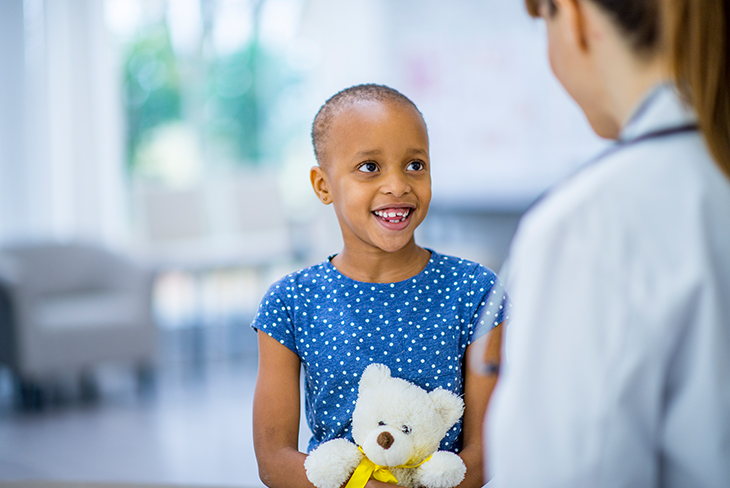When a child is diagnosed with cancer

Each year about 1,000 children are diagnosed with cancer in South Africa, according to the Cancer Association of South Africa (CANSA), and many more go undiagnosed or are misdiagnosed.
When a child is diagnosed, it is usually unexpected and sudden. ‘Most parents are very shocked, some deny the diagnosis, others cry.’ All these reactions are normal and entirely acceptable, says Dr Michelle Mollentze, a paediatrician at Life Eugene Marais Hospital.
What causes childhood cancer?
Childhood cancers are unlike the adult variety, which may be related to lifestyle choices, and most have no discernible cause. About 5% are linked to genetic factors, and a few to microbial ones, says Professor Michael Herbst, health specialist at CANSA.
Where does childhood cancer develop?
Most occur in developing cells such as bone marrow, blood, the nervous system, the kidneys and connective soft tissue, and because of this, children’s cancers tend to grow faster than those of adults. So while, for example, bowel cancer cells in adults double in about 300 days, in children they can double in 30 days or less.
The good news is this rapid growth makes the cancers easier to treat than adult cancers. The reality is that many childhood cancers today are treatable, with success rates of 70–80% in countries that are well-resourced, says Professor Herbst – and in good hospitals locally.
Signs of childhood cancer may include:
- Lump in the abdomen, pelvis, head, neck, limbs, glands or testes.
- White spot in the eye, bulging eyeball, impaired vision or new squint.
- Unexplained fever, loss of appetite and weight, fatigue, pallor, easy bruising or bleeding.
- Unexplained headaches, vomiting, fits or an enlarging head.
- Aching bones, joints or back and easy fractures.
- Change in balance, gait, behaviour or achievement of milestones.
If cancer is confirmed or suspected, your doctor or paediatrician should consult a paediatric oncologist as soon as possible, preferably attached to a major hospital with specialist teams.
Telling your child they have cancer
Dr Mollentze advises you shouldn’t hide your child’s diagnosis from them. ‘The easiest way is to tell your child about the cancer right away – don’t put it off, it only becomes harder.’
‘It also gives your child time to ask questions before treatment starts. The paediatrician can help you explain the diagnosis in terms your child would understand,’ says Dr Mollentze.
Dr Marc Hendricks, a senior specialist at Red Cross War Memorial Children’s Hospital says that doctors usually discuss with the parents whether they can share the diagnosis with their child or if they’d prefer the doctor to do it.
Dealing with cancer in the family
Once you have been given a treatment plan, try to schedule normal home routines to provide a sense of normalcy for your child.
Dr Hendricks says ways to minimise trauma could include:
- Premedicating with anxiolytics for very needle-phobic children
- Applying local anaesthetic cream to blood-taking sites
- Using assisted devices (ports or external lines) and distraction therapy
RN Margie Havenga says your oncologist will take you carefully through the treatment plan. ‘Don’t break the rules put in place by the medical team for your child’s protection – for example ignoring instructions to act on a temperature immediately.’
‘Don’t be afraid to ask questions about your concerns. ‘Have them ready when the doctors do their rounds, jot them in a diary,’ advises RN Margie.
Finding support
In some communities, there is still a stigma attached to cancer. Dr Mollentze urges parents to be open about it with family and friends. She suggests they accept support to get enough rest, eat well and keep up their strength.
Dr Mollentze also advises reaching out to other parents who have walked the same path through support groups. ‘One of the best ways to cope with the uncertainty and fear around cancer is to take control of decisions involving your child’s treatment,’ she says.
‘Work with your medical team (oncologist, paediatrician, neurosurgeon or other specialists) to achieve the best result for your child, and build a relationship of trust with them. Do your own research, she urges, but only from reliable sources, such as the websites of well-established medical centres and universities.’
The information is shared on condition that readers will make their own determination, including seeking advice from a healthcare professional. E&OE. Life Healthcare Group Ltd does not accept any responsibility for any loss or damage suffered by the reader as a result of the information provided.

